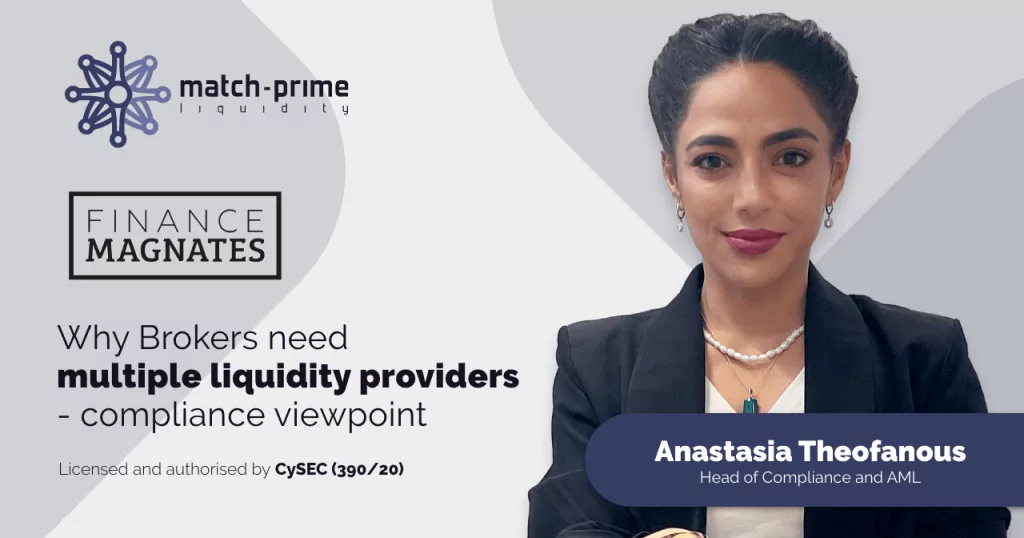The Best Execution is the topic of permanent discussion among the financial services market participants, especially those managing investment firms, as strict regulations bind them. Anastasia Theofanous, the Head of Compliance and AML at Match-Prime Liquidity, shares her thoughts on the legal aspects of sourcing liquidity for Forex and Crypto CFD Brokers from multiple FX Liquidity Providers. As Match-Prime is authorized and regulated by CySEC, the main focus will be on Cyprus Investment Firms (CIF).

Many Brokers, especially at the beginning of their business development, are often confused about FX liquidity providers and their role. Is it worth having several partners, or is settling for one better? What are the pros and cons of each of these scenarios? What kind of license should those FX liquidity providers have? Is there a golden rule that you can apply to find the perfect solution? Many myths and misunderstandings have arisen around this topic.
What is the Purpose of a Broker Liquidity Provider?
Why are companies looking for partners who will provide them with liquidity? It is to guarantee the trouble-free fulfillment of the obligations imposed on the Broker by law. It’s crucial for highly regulated markets such as the EU market. And what is the most critical obligation for FX Brokers? They must take care of their clients’ interests, which is expressed, for example, through the obligation to execute orders on the terms most favourable to the client. It is a necessary act derived straight from UE, CySEC and ESMA regulations. For the reference:
1. Article 27 (1) of the Directive 2014/65/EU;
2. Article 64 of the Commission Delegated Regulation (EU) 2017/565;
3. Article 28 of the CySEC Law 87(I)/2017
4. ESMA Q&As high speculative products;
Traders’ Safety First
In this case, the regulator shows a very responsible approach; putting the safety of a single user first helps build public confidence in the entire market. This sense of security is one of the main reasons clients often choose CySEC-regulated FX Brokers; not everywhere in the world can they count on such protection. Importantly, it is not imposed how individual companies are to achieve the target. We all know that no two people are the same, and no two businesses are alike.
Some FX Brokers operate as market makers and are required to hedge only a small part of their clients’ positions, while others, being just an intermediary, have to secure it all. The needs of such companies are completely different! That is why regulations leave many options to choose from when determining how a company will secure its obligations towards customers and choose a Broker liquidity provider. Although these are primarily suggestions, it does not mean that they do not need to be followed; on the contrary.
For example, “The Investment Services and Activities and Regulated Markets Law” from 2007 and the 2016 CySEC consultation letter on “Selection, use and monitoring of liquidity providers/market makers” clearly favour using multiple FX liquidity providers, in my professional opinion.
While the CySEC document clearly states that the law “does not prohibit CIF from selecting only one liquidity provider”, Brokers cannot be “over-reliant” on a single provider. Moreover, choosing one instead of multiple FX liquidity providers does not release the obligation to monitor the quality of execution, nor does it mean that the Broker automatically meets the best execution obligations.
One of the most important EU directives, commonly known as MiFID II, says explicitly that companies must “take all sufficient steps to obtain when executing orders, the best possible result for their clients”.
I hope that the examples I present show that we are not dealing with a one-off indication but rather with a long-term trend that has been appearing for years in the most important documents of CySEC and the European Union.
Steps Necessary to Obtain the Best Execution
Since we have devoted so much space to the theory of how to take care of the interests of individual clients through the operations of a Broker liquidity provider, I think it is worth delving into the actual process, i.e. what it looks like on the liquidity provider side. In Match-Prime Liquidity, we create all the necessary steps in order for the best execution to be obtained through strategic synergies with well-established execution venues, while in parallel the best execution factors are taken into account for determining the relative importance of the criteria referred to in Article 27(1) of Directive 2014/65/EU:
a. the characteristics of the client, including the categorization of the client as retail or professional;
b. the characteristics of the client order, including where the order involves a securities financing transaction (SFT);
c. the characteristics of financial instruments that are the subject of that order
d. the characteristics of the execution venues to which that order can be directed.
Even though our Clientele are exclusively professional and institutional clients, behind the scenes, our skilled personnel is working for the best possible results to be created. We are constantly improving our internal policies and procedures, such as the best execution monitoring to achieve this.
Hence, having the needs of our Clientele at the top of our priority list, we always seek strategic partners that fulfill our requirements. At the same time, we believe that the transparency of our business relationships with our FX liquidity providers should be reflected in our Order Execution Policy, which is published on our website www.match-prime.com.
Many factors can influence the selection of Broker liquidity providers: pricing, technology or the number of trading instruments in the offer, but we often forget about… trust.
Choosing FX Liquidity Providers Is a Matter of Trust
Regardless of whether you decide to cooperate with one entity or several ones, the best way to reduce risk is to choose a partner that has passed the control of a large supervisory institution and is authorized by it to conduct business. However, this does not mean that an entity from the European Union cannot use the services of a supplier outside the EU or vice versa.
Companies outside the EU may cooperate with those registered in the community, although the process is not as smooth as within the EU. This is because in the past, there have been cases when many companies operating, for example, in Cyprus, lost considerable resources because of an unreliable partner from another country. However, fortunately, this happens less and less.
Regulators from European Union countries, such as CySEC, tend to have a good reputation. Companies licensed by them can provide services to customers situated in third countries after obtaining a legal opinion. For example, Match-Prime Liquidity can provide services to the United Arab Emirates, Mauritius, etc.
The Downsides of Poor Liquidity Arrangements
Choosing a wrong Broker liquidity provider may lead to severe problems, especially when it becomes the sole partner. We all know that it is not easy to rebuild a reputation once tarnished; customers might never be regained once lost. By cooperating with only one supplier, companies risk losses (financial and image-related!).
Technical problems, either due to negligence or completely independent events, such as weather-related mishaps, are probably most common, but there are many more examples. In many countries, the new provisions of the General Data Protection Regulation (GDPR) have led to an exponential increase in claims for unlawful use of data without consent.
One unreliable partner could destroy the reputation of an entire network of related companies. The coronavirus and the restrictions that had to prevent its spreading have stopped free travel; many industries have so far failed to cope with the new situation. In recent days, attention of the whole world has been paid to international sanctions imposed on the Russian economy because of the war in Ukraine.
Once again, the old investing saying comes true – you shouldn’t keep all your eggs in one basket.
Better Safe than Sorry
A Broker choosing to use an additional liquidity provider is creating a safety valve against downtime by enhancing the Company’s Business Continuity in operational risk cases, especially if the server’s hostesses are in different data centres.
Liquidity problems can put a heavy strain on the company and finding a new Broker liquidity provider will not solve the problem immediately because the integration process depends on many factors and can last from a few days to even several months!
It is worth mentioning that an additional liquidity provider will give your company the freedom of having choices and obtaining more competitive prices. This will make the Broker more flexible to customize the instruments offering and enhance profitability. You may often find that a fixed fee for an additional source of liquidity pays off quickly.
In the financial services industry, we need more satisfied Brokers, enhanced investor protection, and end-clients that feel safe with their FX Brokers; thus, having as a guide all of the above, remember to choose a trusted partner as it’s the best way to fulfill the obligations towards your clients and develop your business.
this article was originally published on https://www.financemagnates.com/thought-leadership/sourcing-liquidity-from-multiple-providers-a-compliance-viewpoint/


